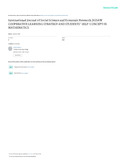Jigsaw Cooperative Learning Strategy and Students’ Self-Concept in Mathematics
Abstract
Knowledge of mathematics as a tool for use in everyday life is important of any individual and society. In schools, it equips students with a unique and powerful set of skills to understand the world and also become productive members of the society. Secondary school students in Kenya have continued to perform poorly in mathematics in the Kenya Certificate of Secondary Education (KCSE) examinations. This raises concern to all stakeholders in education given the importance they attach to mathematics. Although there could be a variety of reasons influencing performance in mathematics, research demonstrates that factors such as inadequate facilities in the schools like the text books, poor attitude towards the subject by the students and teachers, gender stereotyping, lack of role models, low mathematics self-concept and the ineffective instructional methods used by teachers have been attributed to causing mainly poor performance in the subject. There is however inadequate documented information in research conducted in Kenya on the effect of the use of Jigsaw Cooperative learning Strategy on students’ self-concept in subjects such as mathematics. This study therefore sought to investigate the effect of using Jigsaw Cooperative learning Strategy as a teaching method on learners self concept in mathematics. The study used a quasi-experimental research design by adopting the Solomon four non-equivalent control group design. Two experimental groups received the Jigsaw cooperative learning Strategy as treatment and two control groups were taught using the conventional learning/teaching methods. Four co-educational secondary schools were randomly selected from a target of 67secondary schools in Laikipia County. A mathematics self-concept scale (MSC) was administered to form three students as the unit of analysis in the selected schools. The MSC was piloted in a school which was not used in the study in Laikipia County and its reliability estimated. The reliability coefficient of the MSC was found to have a Cronbach alpha coefficient of 0.96 . The collected data were analyzed using t-test, ANOVA and Scheffe post hoc to test hypotheses at the .05 level of significance. The study revealed that students who were taught mathematics using Jigsaw learning strategy had a higher mathematics self-concept score compared to those taught using the conventional teaching methods. The study recommends that teachers should adopt the use of Jigsaw learning strategy in mathematics instruction in order to improve learners self concept in mathematics.
URI
https://www.researchgate.net/publication/328131092_International_Journal_of_Social_Science_and_Economic_Research_JIGSAW_COOPERATIVE_LEARNING_STRATEGY_AND_STUDENTS%27_SELF-CONCEPT_IN_MATHEMATICShttp://hdl.handle.net/123456789/6126

